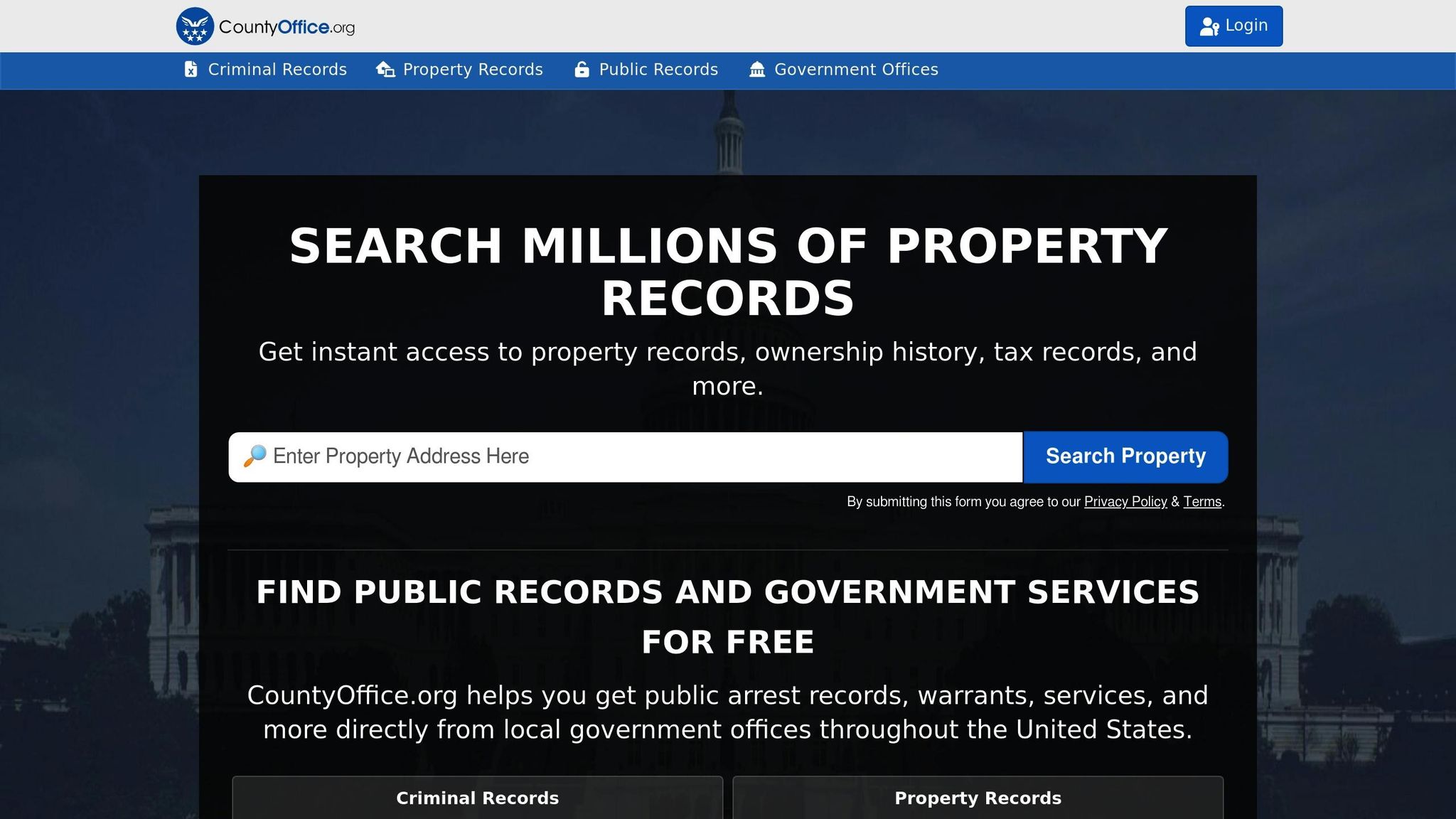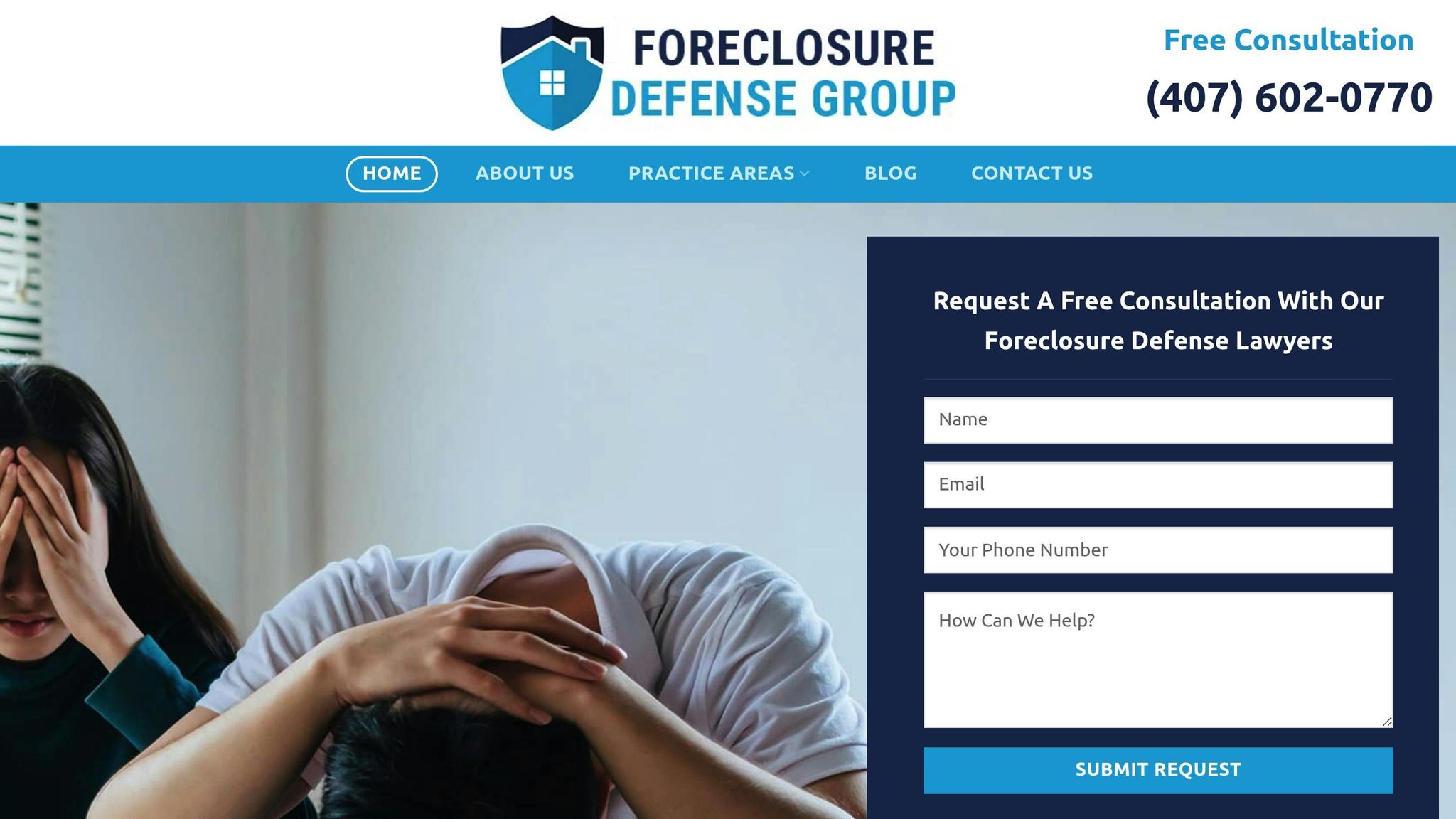When mortgage disputes arise – whether from payment errors, unfair contract terms, or foreclosure threats – attorneys step in to protect homeowners. They review documents, negotiate with lenders, and craft defenses to safeguard your rights and home. Key causes of disputes include:
- Payment issues: Errors in interest calculation, escrow mismanagement, or late fee disputes.
- Contract problems: Confusing loan terms, denied modifications, or excessive fees.
- Foreclosure risks: Aggressive lender actions or improper procedures.
Attorneys bring legal expertise to resolve these challenges, offering solutions like loan modifications, foreclosure defenses, and alternative options (e.g., short sales or deeds-in-lieu). Acting quickly is crucial to explore your options and avoid long-term financial harm. Hiring an attorney ensures your rights are protected and helps you navigate the legal complexities of mortgage disputes.
What Does a Mortgage Attorney Do? – CountyOffice.org

Common Causes of Mortgage Disputes
Understanding why mortgage disputes arise can help homeowners spot potential issues early and take the necessary steps to address them. These disputes generally fall into three main categories, each requiring a specific legal approach.
Payment Disagreements
One common source of disputes involves errors made by lenders. For instance, lenders might miscalculate interest rates by using incorrect methods or deviating from the agreed-upon locked-in rate. These mistakes can lead to recurring overcharges that add up significantly over time.
Another frequent issue is escrow account mismanagement. Lenders sometimes overestimate property tax payments or insurance premiums, causing homeowners to pay more than they actually owe. These overpayments often go unnoticed until they accumulate, potentially requiring legal action to resolve.
Incorrectly applied late payment penalties also lead to disagreements. For example, fees might be charged for payments mailed on time but delayed due to postal issues, or for delays caused by the lender’s own processing system.
Payment timing issues can also create complications. Changes in employment – like shifts in pay schedules – can lead to conflicts with a homeowner’s mortgage payment schedule. Similarly, disputes often arise when joint mortgage holders experience relationship breakdowns. If one party moves out, the remaining homeowner may struggle to cover the full payment, leading to financial strain and disagreements over responsibilities.
Next, let’s look at how unclear or unfair loan terms can spark disputes.
Loan Terms and Contract Problems
Confusing or unfair loan terms are another major cause of disputes. Complex contract language can obscure critical details like payment obligations, interest calculations, or penalty structures, leaving homeowners feeling blindsided.
Payment modification disputes often occur when homeowners face financial difficulties and request temporary adjustments, such as reduced payments or interest-only plans. Some lenders deny these requests outright, adding to the stress. Meanwhile, co-ownership issues can arise when one co-owner fails to pay their share of the mortgage. Without formal agreements in place, disputes over financial responsibilities can escalate quickly.
Excessive fees and charges also fuel frustration. Homeowners may face unreasonable arrears fees, inflated legal costs, or surprise charges like field agent visit fees – all of which can strain relationships with lenders.
When these issues aren’t resolved, they can escalate into foreclosure threats.
Foreclosure Threats
Foreclosure is one of the most serious outcomes of mortgage disputes. It often occurs when earlier attempts to resolve conflicts fail or when lenders act aggressively to protect their interests without fully considering the homeowner’s situation.
For example, disputes can arise when foreclosure proceedings are initiated while homeowners are still negotiating loan modifications or alternative payment plans. In some cases, homeowners may be actively working toward a resolution, only to find themselves served with foreclosure paperwork.
Improper foreclosure procedures can provide grounds for legal challenges. Lenders must follow specific legal protocols and timelines when initiating foreclosure. Failing to meet these requirements – such as providing proper notice, maintaining accurate documentation, or clearly establishing mortgage debt ownership – can give homeowners a strong defense.
Given the complexity of these disputes, professional legal guidance is often necessary. Navigating the laws and regulations surrounding mortgages requires expertise to protect homeowners’ rights and work toward a favorable resolution.
How Attorneys Resolve Mortgage Disputes
Once the factors behind a mortgage dispute are identified, attorneys step in with focused strategies. Their goal? To negotiate with lenders and advocate for homeowners, working toward outcomes that benefit their clients.
Reviewing Documents and Analyzing the Case
The first step is digging into the details. Attorneys carefully review mortgage documents and related communications to pinpoint the exact issues. This analysis sets the stage for meaningful settlement discussions and helps shape the overall approach to resolving the dispute.
Handling Negotiations with Lenders
Attorneys take charge of all interactions with lenders, ensuring legal protocols are followed while safeguarding the homeowner’s rights. They typically start by sending a demand letter that clearly outlines the dispute. From there, they work on negotiating solutions like loan modifications, forbearance agreements, or tailored repayment plans that align with the homeowner’s needs.
Strategies for Foreclosure Defense
When foreclosure proceedings are already underway, attorneys use their expertise to explore alternatives. Options such as short sales or deeds-in-lieu of foreclosure can provide homeowners with a way to mitigate losses and avoid the long-term impacts of foreclosure. By negotiating these alternatives, attorneys aim to find a path forward that minimizes financial and emotional strain.
sbb-itb-d613a70
Benefits of Hiring an Attorney for Mortgage Disputes
When it comes to navigating mortgage disputes, having an attorney on your side can make a world of difference. Beyond resolving the immediate issue, they provide critical safeguards for homeowners, offering expertise that ensures compliance with intricate state and federal mortgage laws. This not only helps avoid errors in documentation but also ensures everything is handled correctly from a legal standpoint. Additionally, attorneys act as strong advocates, working tirelessly to protect their clients’ interests and simplify complex legal challenges.
Legal Expertise and Advocacy
Attorneys bring a deep understanding of the law to the table, which is invaluable when dealing with the complexities of mortgage regulations. Their ability to interpret and apply legal provisions ensures disputes are resolved effectively while reducing the risk of future issues. By addressing every detail with precision, they help homeowners meet all legal requirements without unnecessary stress.
Improved Negotiation Leverage
Having an attorney involved in negotiations with lenders can significantly shift the dynamic. Their professional authority and legal knowledge send a clear message of seriousness, often leading to better settlement terms than a homeowner might secure alone. This added weight can make all the difference in achieving a more favorable outcome.
Protecting Finances and Credit
Quick and favorable resolutions are key to minimizing the financial fallout of mortgage disputes. Attorneys work to prevent costly consequences like foreclosure, which can devastate credit scores and have long-term financial effects. By resolving issues efficiently, they help safeguard homeowners’ financial stability and credit health for the future.
Services Offered by Foreclosure Defense Group
Foreclosure Defense Group turns proven legal strategies into practical services designed to support homeowners facing mortgage disputes or foreclosure. The firm provides personalized legal solutions tailored to each client’s unique situation, ensuring guidance through every stage of mortgage-related challenges. As they emphasize:
"No Matter The Hardship, We Have Solutions".
Foreclosure Defense and Legal Representation
Foreclosure Defense Group customizes legal strategies to suit each homeowner’s circumstances, offering multiple options for resolution. Their attorneys actively defend against foreclosure actions by scrutinizing the lender’s claims and protecting the homeowner’s rights. They dig deep into each case to uncover potential defenses that could challenge the validity of a mortgage, creating leverage for negotiation. Additionally, they tap into government programs, such as HAMP-related benefits, to secure financial relief for clients. The firm reassures clients:
"Rest assured that your foreclosure defense attorney will fight tooth and nail to help save your home and reclaim your life".
This proactive approach not only strengthens legal defenses but often opens doors to negotiations that might otherwise remain closed. Alongside foreclosure defense, the firm also provides expert guidance on debt restructuring and alternative solutions to foreclosure.
Bankruptcy Assistance and Loan Modifications
For homeowners struggling with unmanageable mortgage terms, the firm’s attorneys offer loan modification services aimed at making payments more affordable. These modifications may involve adjusting payment schedules, lowering interest rates, or revising other loan terms. For those facing extreme financial hardship, the firm provides bankruptcy assistance, which can immediately halt foreclosure proceedings. They guide clients through Chapter 13 or Chapter 7 bankruptcy processes to delay foreclosure and address overdue payments.
The firm also negotiates loan forbearance agreements for clients experiencing temporary financial setbacks. These agreements pause or reduce payments for a specified period, giving homeowners time to regain financial stability. However, when retaining the home isn’t feasible, they offer practical solutions to help clients transition smoothly.
Deed-in-Lieu and Short Sale Options
When keeping the home is no longer a realistic option, Foreclosure Defense Group helps homeowners minimize financial repercussions while transitioning out of their properties. They assist with deed-in-lieu of foreclosure agreements, where homeowners voluntarily transfer ownership to the lender in exchange for debt forgiveness, avoiding the drawn-out foreclosure process. For short sales, the firm works closely with both homeowners and lenders to facilitate property sales for less than the mortgage balance.
The process begins with a free initial consultation, during which attorneys review case specifics and outline all available options. As the firm notes:
"Speaking with a skilled mortgage attorney will help you to understand the various choices available to you".
Their attorneys negotiate directly with lenders to protect clients from deficiency judgments and other financial risks. Stressing the importance of acting quickly, the firm advises:
"Waste no time, as the clock is ticking, and it’s critically important that we assert your claims and defenses in a timely manner".
Conclusion: Getting Legal Help for Mortgage Disputes
When it comes to mortgage disputes, acting quickly can make all the difference. The earlier you seek legal advice, the more opportunities you have to explore solutions that might not be immediately obvious.
Choosing the right attorney is a critical step. Start by pinpointing your specific legal issue – whether it’s a payment conflict, foreclosure risk, or challenges with loan modifications. Ask trusted friends or family for recommendations, check online directories, and consult your state bar association for qualified attorneys.
Before meeting with a lawyer, gather all essential documents, such as your mortgage agreement, payment records, correspondence with your lender, and any foreclosure notices. When interviewing potential attorneys, focus on those with a proven history of handling similar cases. Additionally, confirm that they are licensed in your state and in good standing with the bar.
Legal representation can often save you money in the long run by negotiating settlements, avoiding foreclosure-related expenses, and protecting your credit score. Skilled attorneys ensure that your rights are upheld, helping you navigate disputes with lenders who often have significant resources at their disposal. This proactive step can turn a stressful situation into a manageable process.
Don’t wait until foreclosure proceedings begin. Acting early gives your attorney more leverage to negotiate favorable terms and explore solutions like loan modifications, foreclosure defense, or even short sales. With the right legal guidance, what feels overwhelming can be transformed into a clear and actionable plan.
For personalized assistance, you might consider reaching out to Foreclosure Defense Group, which specializes in foreclosure defense and resolving complex mortgage disputes.
FAQs
What common mistakes do lenders make that lead to mortgage disputes, and how can homeowners spot them early?
Lenders aren’t perfect, and mistakes can happen. They might miscalculate interest rates, mishandle escrow accounts, or apply fees incorrectly. These errors can lead to disputes that could impact your mortgage.
As a homeowner, it’s important to stay vigilant. Keep an eye out for unexpected charges, higher-than-expected interest rates, or errors in your documents – these could signal a problem. Make it a habit to review your loan statements regularly and double-check all related paperwork. If something doesn’t look right, don’t wait. Reaching out for legal advice quickly can help safeguard your rights and address the issue before it escalates.
How can an attorney help homeowners negotiate loan modifications or alternative payment plans?
An attorney serves as a strong advocate for homeowners during loan modification or alternative payment plan negotiations. They handle direct communication with lenders to work out more manageable terms, such as lowering monthly payments or restructuring repayment schedules, ensuring the homeowner’s financial circumstances are properly considered.
Beyond negotiations, attorneys carefully review and draft modification agreements to make sure the terms are fair, legally compliant, and practical for the homeowner. Their expertise helps safeguard homeowners from potential risks, protect their legal rights, and, in many cases, keep foreclosure at bay.
What are the legal options for homeowners facing foreclosure, and how can an attorney assist in protecting their rights?
Homeowners facing foreclosure have several legal avenues to explore that can protect their rights and possibly resolve the situation. A skilled attorney can carefully review your case to uncover defenses like mistakes in loan servicing, errors in the foreclosure process, or breaches of homeowner protection laws.
Beyond that, attorneys can also negotiate directly with lenders, opening up options such as loan modifications, forbearance agreements, or short sales. Their knowledge ensures homeowners can fully leverage government programs and legal safeguards meant to support those experiencing financial hardship. With proper legal guidance, you can work toward a better resolution and take steps to protect your home.
Related Blog Posts
- 5 Warning Signs Your Home May Be Facing Foreclosure
- 7 Legal Rights Every Florida Homeowner Should Know
- 3 Ways to Stop Foreclosure in Florida
- Loan Modification Document Checklist


